Rehabit Work: The Great Unwinding of the Protestant Work Ethic
Redefining work, rediscovering purpose beyond productivity
For centuries, the Protestant work ethic shaped our sense of identity, convincing us that productivity equals worth. But as AI and automation redefine labor, humanity faces a profound shift: work is no longer the measure of who we are, but only one thread in the tapestry of a meaningful life. Rehabit Work begins by questioning this inherited story and opening the door to a future where purpose, play, and contribution replace endless grind.
Chapter 1: The Parable
The Parable of the Fisherman and the MBA
A Harvard MBA vacations in a small Mexican fishing village. At the pier, she sees a local fisherman docking his small boat with several large yellowfin tuna.
“How long did it take to catch them?” she asks.
“Only a little while,” the fisherman replies.
“Why don’t you stay out longer and catch more?”
“I have enough to support my family’s immediate needs.”
The MBA scoffs. “I have an MBA from Harvard. Let me help. You should spend more time fishing. With the proceeds, buy a bigger boat. With a bigger boat, you could catch more fish and buy several boats. Eventually, you’d have a fleet. Instead of selling to a middleman, you’d sell directly to the processor, eventually opening your own cannery. You’d control the product, processing, and distribution. You’d leave this village and move to Mexico City, then LA, and eventually New York, where you’d run your expanding enterprise.”
The fisherman asks, “How long would this take?”
“Fifteen, maybe twenty years.”
“But what then?”
The MBA laughs. “That’s the best part! When the time is right, you’d announce an IPO and sell your company stock to the public. You’d make millions!”
“Millions? Then what?”
“Then you’d retire. Move to a small coastal fishing village where you’d sleep late, fish a little, play with your grandchildren, take siesta with your wife, stroll to the village in the evenings where you’d sip wine and play guitar with your amigos.”
The fisherman smiles. “Isn’t that what I’m doing now?”

Chapter 2: The Identity Crisis
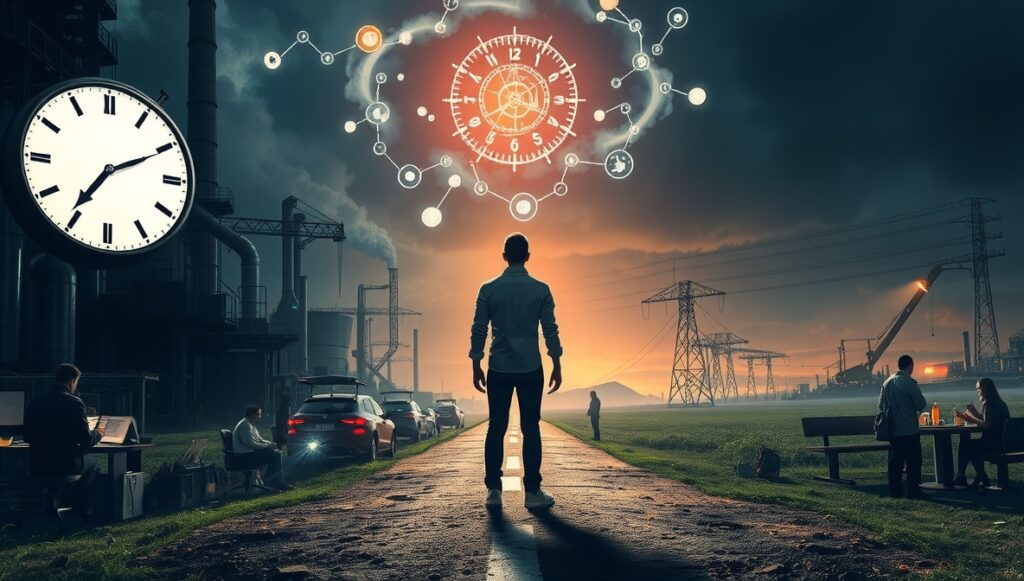
The Identity Crisis Nobody Saw Coming (Except Everyone Who Was Paying Attention)
We’ve built entire civilizations around a lie: that human worth equals economic productivity. For 300 years, since the Protestant Reformation wedded salvation to hard work, we’ve been running a collective software program that says idleness is sin, productivity is virtue, and your job is your identity.
Now the machines can do the job better. And we’re having an existential meltdown not because we’re losing our income—Universal Basic Income could solve that—but because we’re losing our story. The fisherman knew something the MBA didn’t: work was never supposed to be our identity. It was supposed to be our contribution.
Welcome to Rehabit Work: not a framework for finding new jobs in an AI economy, but a complete reimagining of what work means when the machines handle production and humans must rediscover purpose. This isn’t about the future of work—it’s about the future after work as we know it.
Chapter 3: The MVP Crisis
The MVP Crisis: When Mission, Vision, and Purpose Collapse
Corporate America gave us MVP—Mission, Vision, Purpose—as organizational tools. We internalized them as personal identity. “What do you do?” became the first question at every party, every date, every encounter. We are what we produce. We matter because we contribute GDP.
But what happens when:
Your Mission (what you do daily) can be done better by AI?
Your Vision (where you’re heading professionally) leads nowhere because your entire industry is automating?
Your Purpose (why you matter) was tied to a role that no longer exists?
This isn’t just unemployment. It’s an unmapping of meaning. The lawyer who spent decades mastering precedents watches AI analyze case law in seconds. The designer who agonized over pixels sees AI generate thousands of variations instantly. The analyst who prided herself on pattern recognition realizes AI spots patterns she never could.
They don’t just lose jobs. They lose the story they’ve been telling themselves about who they are and why they matter.
The fisherman never had this problem. His identity wasn’t “commercial fishing executive.” It was fisherman, father, friend, guitarist, storyteller. The work was just one thread in a richer tapestry.
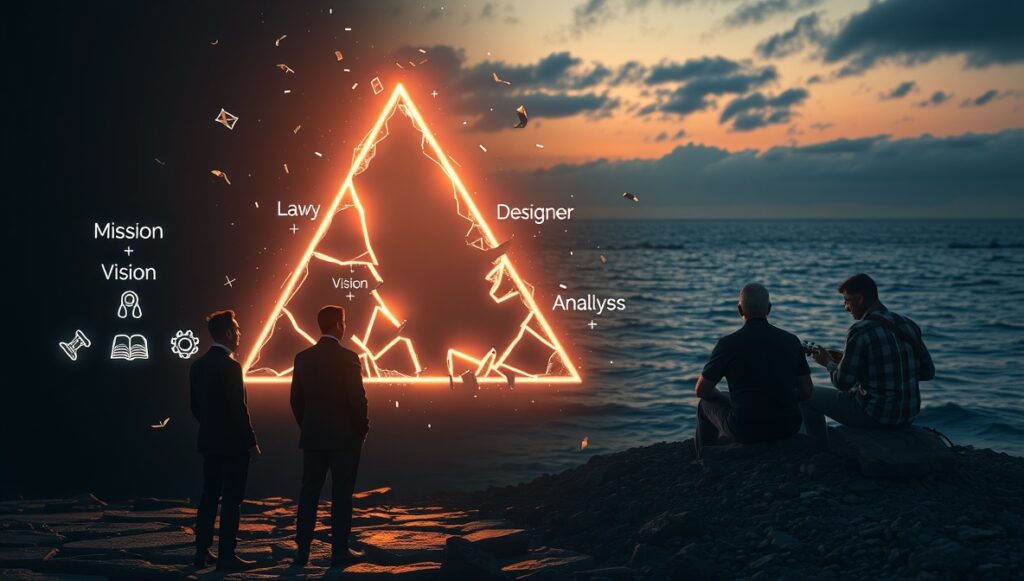
Chapter 4: The Three Migrations of Work
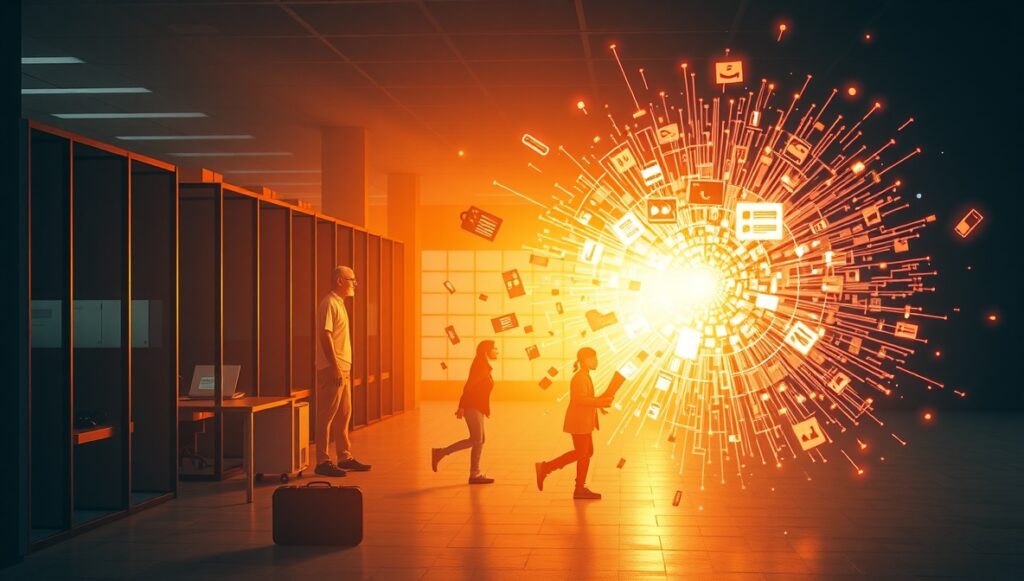
Migration 1: From Jobs to Gigs to Glimpses
The gig economy was supposed to free us. Instead, it atomized employment into micro-transactions. But even gigs are too structured for what’s coming. Enter the “Glimpse Economy”—momentary value creation, instantaneous contribution, work measured in insights rather than hours.
You won’t have a job or even gigs. You’ll have glimpses—moments when your unique perspective, creativity, or wisdom adds value that AI cannot generate. A grandmother’s recipe that becomes a global food trend. A child’s question that sparks a scientific breakthrough. A poet’s metaphor that reframes a civilization’s challenge.
Migration 2: From Careers to Portfolios to Possibilities
The career ladder is already broken—AI just pushes it off the cliff. Sequential progression through hierarchical roles? Obsolete. Even portfolio careers—multiple revenue streams—thinking too small.
We’re moving toward Possibility Profiles—dynamic, evolving collections of capabilities, interests, and contributions that shift based on what the world needs and what brings you alive. You’re not a “marketing manager” or even a “marketer/consultant/coach.” You’re a pattern recognizer, story weaver, connection catalyst, transformation guide—whatever emerges from the intersection of your gifts and the world’s needs.
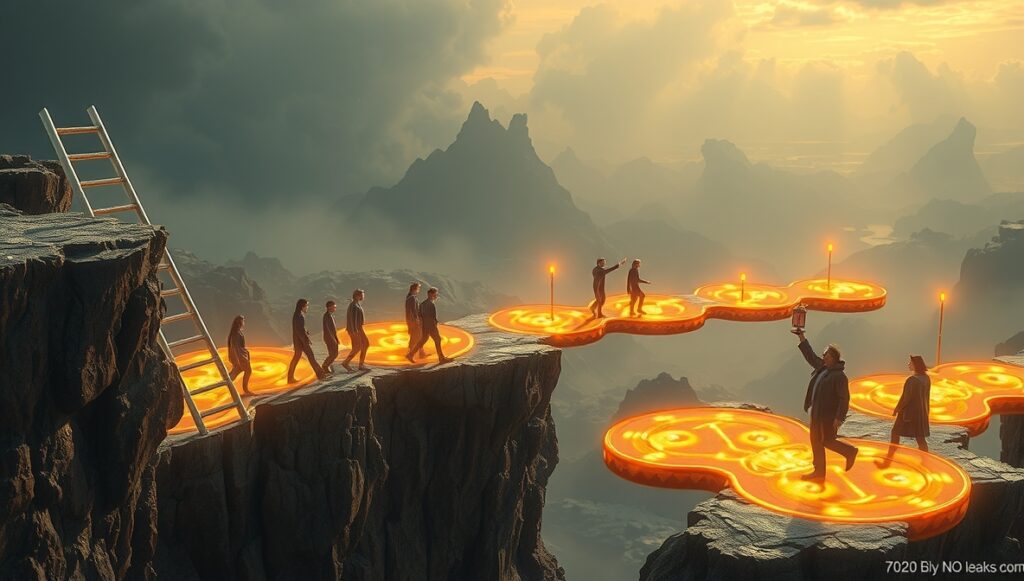
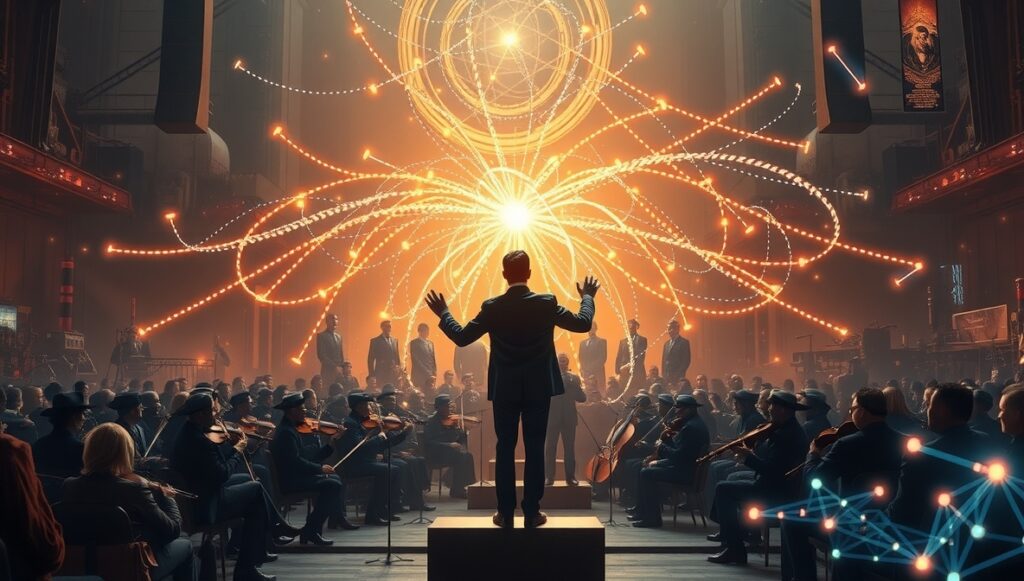
Migration 3: From Productivity to Creativity to Conductivity
First we measured value by production—how much you could make. Then creativity—what new you could conceive. But in an AI age where machines both produce and create, human value lies in conductivity—your ability to conduct energy, meaning, and connection between disparate elements.
Like an orchestra conductor who plays no instrument but creates symphony, future work is about orchestration rather than execution. You won’t write the code—you’ll conduct the AI that writes it. You won’t analyze the data—you’ll conduct the synthesis of what it means. You won’t create the content—you’ll conduct the narrative that gives it meaning.
The fisherman was always a conductor—conducting relationships in the village, conducting traditions through generations, conducting joy through his guitar. The MBA measured only his tuna production.
Chapter 5: The 40•4•4•40 Bridge
The 40•4•4•40 Bridge: From Protestant Work Ethic to Post-Work Purpose
The 40•4•4•40 framework isn’t just about working less—it’s about transitioning from work-as-identity to work-as-contribution. Each reduction creates space for rediscovery:
40-Minute Deep Work Blocks: When you only have 40 minutes, you can’t waste time on performative busyness. Every moment must matter. This forces the question: What actually creates value?
4-Hour Work Days: With only 4 hours, you can’t maintain the illusion of productivity through presence. You must identify your true contribution. Most discover they were only really working 4 hours anyway—the rest was theater.
4-Day Work Weeks: Three days off breaks the work-identity fusion. You have enough time to remember who you are beyond your role. Hobbies become interests. Interests become contributions. Contributions become identity.
40-Week Work Years: Twelve weeks of distributed restoration makes it impossible to define yourself solely through work. You must develop other sources of meaning, other ways of mattering, other stories about who you are.
This isn’t a productivity hack. It’s identity rehabilitation—slowly weaning ourselves off the drug of work-as-worth while building new frameworks for meaning.

Chapter 6: Ending as Beginning
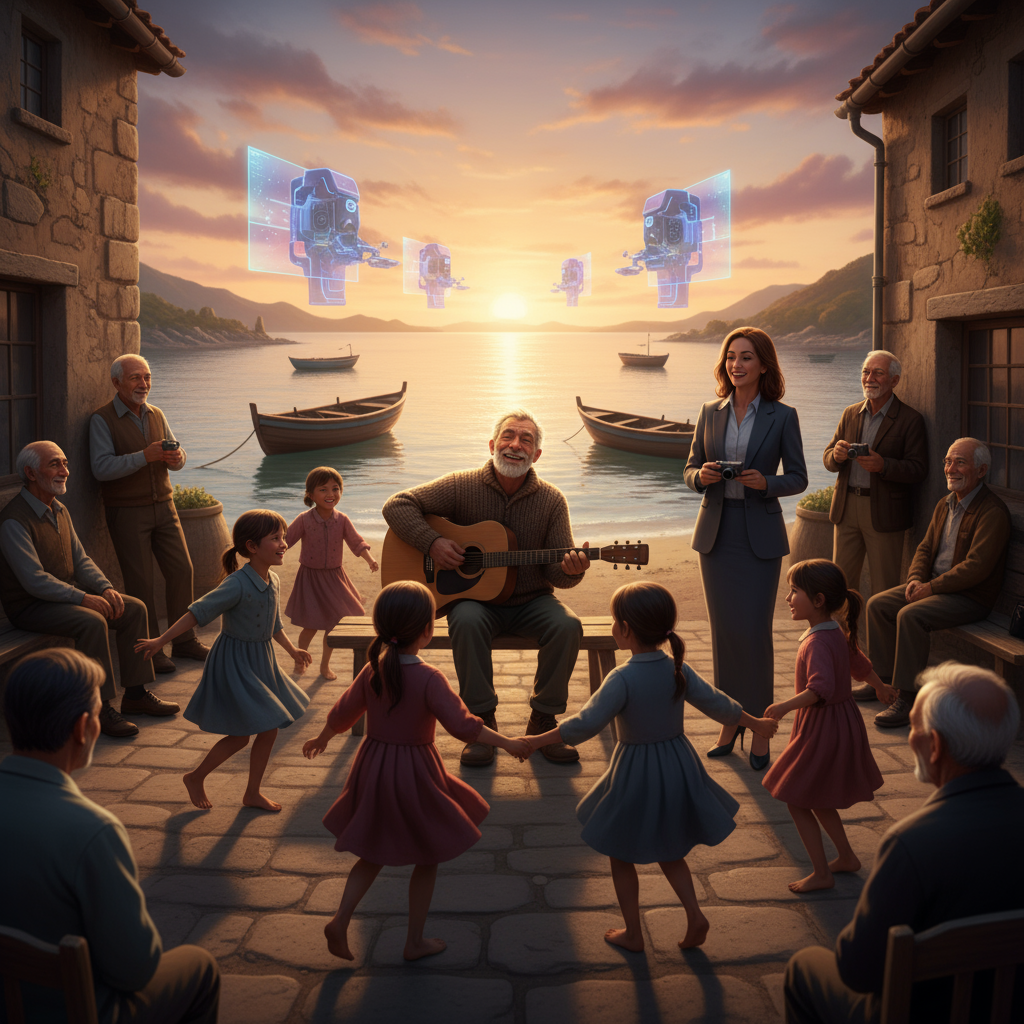
The Ending That's a Beginning
Remember our fisherman? The MBA thought she was teaching him about success. But he was teaching her about sufficiency. Not the sufficiency of settling for less, but the sufficiency of recognizing enough. Enough money. Enough activity. Enough achievement. The sufficiency that creates space for significance.
As AI handles the tuna catch of civilization—the production, the optimization, the scaling—we’re all becoming fishermen. Not in poverty but in possibility. Not in limitation but in liberation. Finally free to discover what we came here to do beyond what the economy needed us to produce.
The Protestant work ethic told us “idle hands are the devil’s workshop.” But what if idle hands are evolution’s workshop? What if the space between jobs is where we discover our real work? What if unemployment is humanity’s cocoon, and what emerges isn’t workers but something we don’t yet have words for?
The fisherman plays his guitar in the village square. Children dance. Old men remember their own dancing days. Tourists stop to listen, forgetting their itineraries. Nobody’s being productive. Everyone’s being human.
This isn’t the end of work. It’s the end of work as identity, work as worth, work as story. It’s the beginning of work as play, work as gift, work as one beautiful thread in the larger tapestry of a life fully lived.
The MBA finally understands. She pulls out her phone to check email, then stops. Instead, she asks the fisherman, “Could you teach me that song?”
He smiles. “That depends. Do you have forty minutes?”
She laughs, remembering her own frameworks. “I have all the time in the world.”
And for the first time in her life, she means it.
Chapter 7: Welcome to Rehabit Work
Where work stops being who you are and becomes what you contribute.
Where forty minutes matters more than forty hours.
Where glimpses create more value than grinds.
Where the fisherman’s wisdom finally defeats the MBA’s metrics.
Where we stop asking “What do you do?” and start asking “What are you becoming?”
The machines are coming for your job. Thank God. Your real work is about to begin.
The fishing village awaits. The guitar is tuned. The evening is young.
Will you dance?
Contact us
Our Support and Sales team is available 24 /7 to answer your queries



